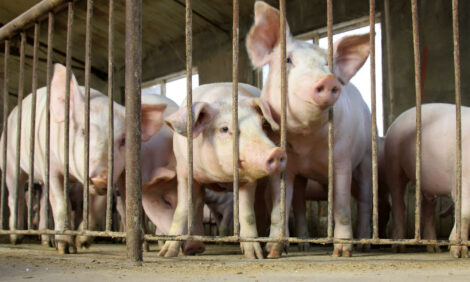



Porcozin: the backpack disinfectant treating diarrhoea in pigs
A motorised backpack sprayer disinfectant, Porcozin, is effective against diarrhoea in three out of four litters.Michael Lundgaard’s old farrowing pen in Korsør, Denmark, accommodates two of the five weekly litters of his pig herd. As the pen is not sectioned, it is not washed, and this may cause problems with the suckling pigs suffering from diarrhoea. Normally that would lead to individual treatment of the affected weaners but for the past two years, Michael Lundgaard has started using other means.
“I heard about the disinfectant Porcozin from the distributing company which wanted to test it in a pig herd”, Michael Lundgaard explains.
Porcozin
- Biological disinfectant
- Sprayed by means of a backpack sprayer
- Effective against many bacteria, spores and viruses.
“We do not have a fixed limit for when to use it, we consider the problem of the diarrhoea from day to day”, supervisor Rasmus Rasmussen explains. When they decide to disinfect, they pour Porcozin into the sprayer tank and then spray the entire tank content within the farrowing pen. Personal protective equipment is not required, however, the staff normally use a mask during the spreading. The ventilation is run as normal.
According to Hero Supply, the distributor of Porcozin, 2.5 litres of Porcozin will cover a traditional farrowing pen with approx. 400 weaners.
“Over the first couple of days post-treatment, about 75 per cent of the litters will see the diarrhoea go away. The remainder of the litters need treatment with antibiotics”, the supervisor says. On average, they use the disinfectant a couple of times each month. The supervisor plans to try the disinfectant also in the weaner pens, for example, in connection with change of feed which sometimes causes diarrhoea.
Saving time and antibiotics
Porcozin is far more effective than individual treatment of the weaners and furthermore, it is obviously not considered as an antibiotic treatment. No negative effects have been observed with either sows or suckling pigs from the disinfectant; the only disadvantage would be, that the effect has not always been enough to remove the diarrhoea completely.
“We have a high health state in our pig herd and that might of course also influence the good effect we see”, Michael Lundgaard adds. He cannot say whether other herds will experience a similar reduction in cases of diarrhoea. It might also depend on which bacteria cause the diarrhoea.
Furthermore, Seges Svineproduktion has been testing the disinfectant on their pig herd for six months to see if it had any effect on MRSA.
“There is no effect on MRSA, but we are certain that it has an effect on diarrhoea”, says Michael Lundgaard.
Translation of article by Morten Thomsen from LandbrugsAvisen SVIN (+45 42 90 10 10)







